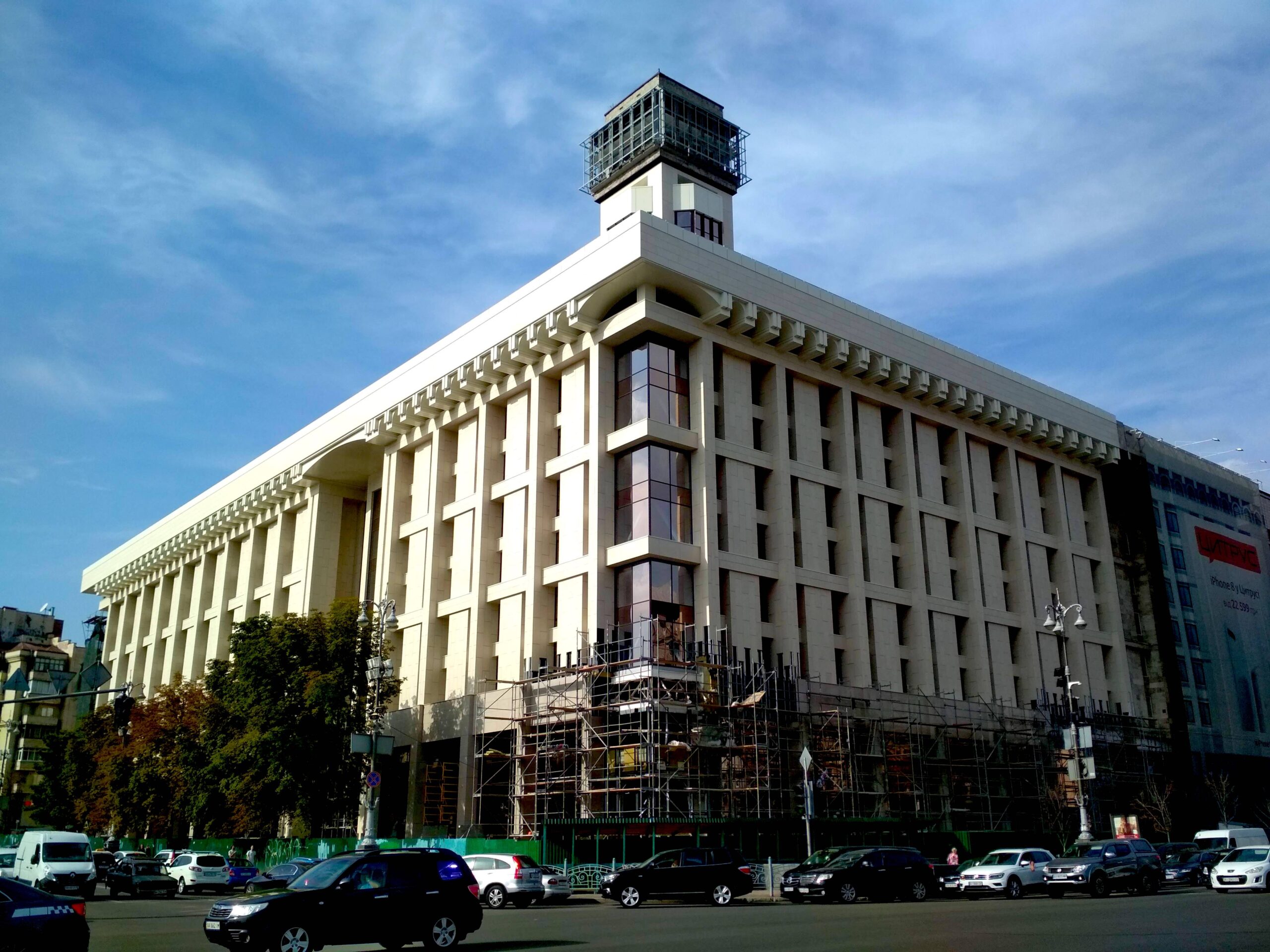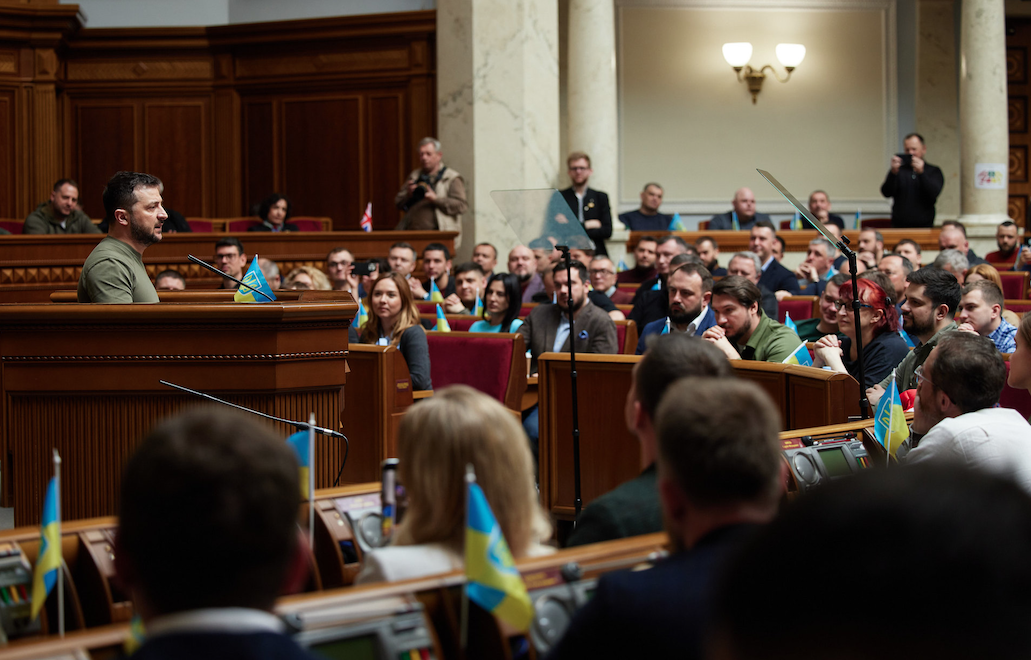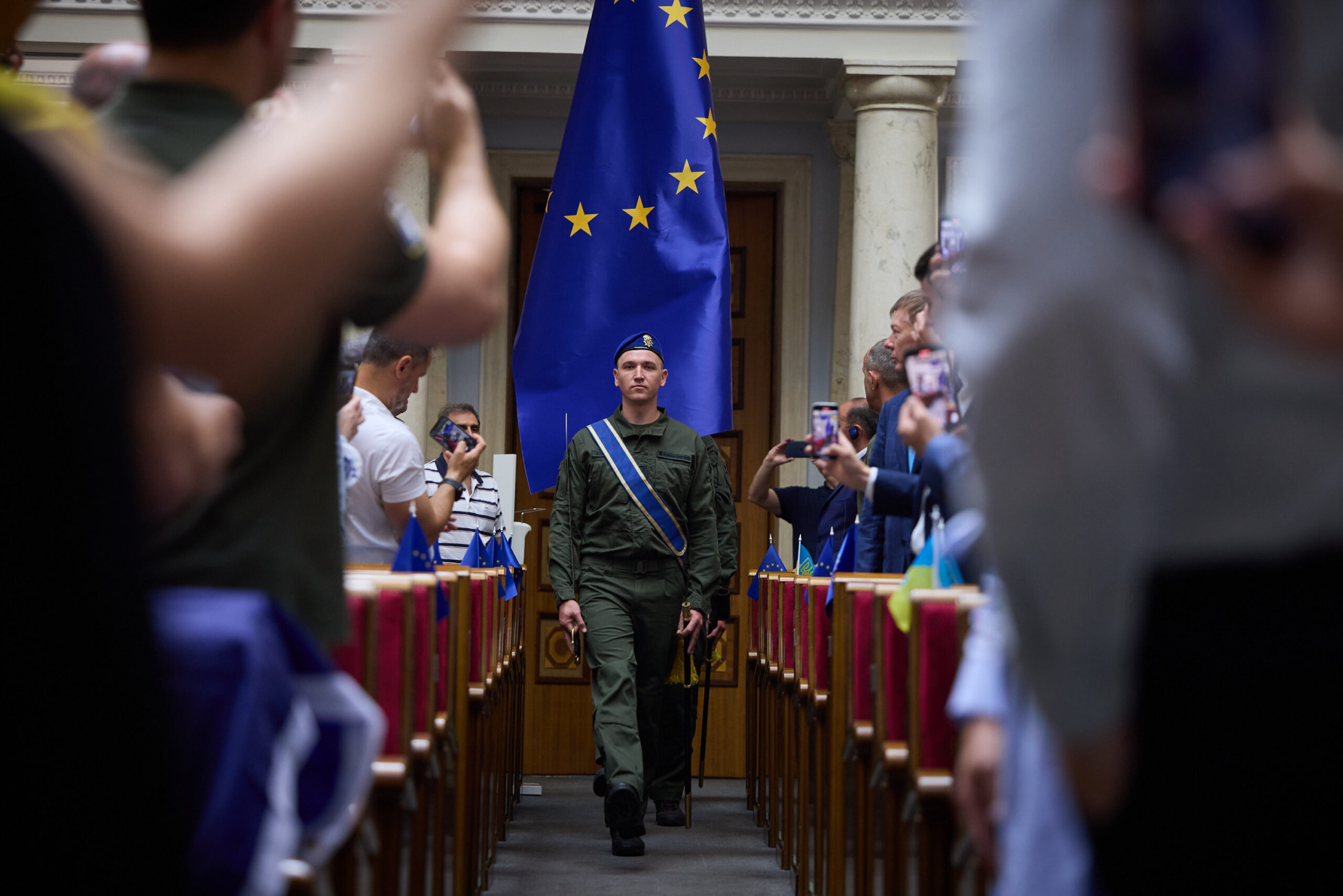Two new radical measures are prompting fears of Ukrainians losing workplace rights permanently as the war puts huge pressure on the country’s economy, Thomas Rowley and Serhiy Guz report.

Trade Unions Building in Kiev in September 2018 during reconstruction. (VoidWanderer, CC BY-SA 4.0, Wikimedia Commons)
By Thomas Rowley and Serhiy Guz
openDemocracy
The Ukrainian parliament has passed two new radical measures on labour liberalisation, prompting fears of Ukrainians losing workplace rights permanently as Russia’s war puts huge pressure on the country’s economy.
In two laws passed on Monday and Tuesday, MPs voted to legalise “zero-hours contracts” and made moves towards removing up to 70 percent of the country’s workforce from protections guaranteed by national labour law.
The latter measure means the national labour code no longer applies to employees of small- and medium-sized enterprises; instead, it is proposed that each worker strikes an individual labour agreement with their employer. It also removes the legal authority of trade unions to veto workplace dismissals.
Draft law 5371 had previously been criticised by the International Labor Organization, as well as Ukrainian and European trade unions, on the basis that it could “infringe international labour standards.”
Ukraine’s ruling Servant of the People party argued that the “extreme over-regulation of employment contradicts the principles of market self-regulation [and] modern personnel management.”
Red tape in Ukraine’s HR laws, it suggested, “creates bureaucratic barriers both for the self-realisation of employees and for raising the competitiveness of employers.”
The Federation of Trade Unions of Ukraine will now ask President Volodymyr Zelensky to veto draft law 5371 when it goes to him for signature — but will not make the same request over the proposed law on zero-hours contracts, Ukrainian MP Vadym Ivchenko told openDemocracy.
Nataliia Lomonosova, an analyst at Ukrainian think tank Cedos, warned that the two laws could further deteriorate an already difficult socio-economic situation for Ukrainians suffering from Russia’s military campaign.
According to the U.N.’s latest numbers, Russia’s invasion has led to at least 7 million people becoming displaced inside Ukraine itself, which has been compounded by a severe economic crisis hitting families and individuals hard. At the same time, the World Bank has predicted that Ukraine’s economy will contract by 45 percent this year.
With these factors in mind, Lomonosova argued that Ukrainians have little choice or bargaining power when it comes to employers — the number of available vacancies is vastly disproportionate to the number of people now looking for work in the country. “People right now have no bargaining power, and trade unions cannot protect them,” she said.
Speaking to openDemocracy, Lomonosova expressed a fear that, as a result of the displacement, “many people will find themselves in the situation of Ukrainian migrant workers” in their own country — meaning, for instance, people will have little choice but to accept poor conditions and to be ever more dependent on their employers.
‘Window of Opportunity’

President Volodymyr Zelenskyy giving a speech in Ukraine’s parliament in May. (President of Ukraine)
A leading member of Zelensky’s party promised further liberalisation of Ukraine’s labour legislation earlier this month.
“These are draft laws that business is waiting for, draft laws that will protect the interests of all entrepreneurs. And workers, too, by the way,” wrote MP Danylo Hetmantsev on Telegram on 9 July.
“A worker should be able to regulate his relationship with an employer himself. Without the state,” noted Hetmantsev, who is head of the Ukrainian parliament’s finance committee.
“This is what happens in a state if it’s free, European and market-oriented. Otherwise, the country will be travelling with one leg on an express train to the EU, and with another inside a Soviet-era train going in the other direction.”
Ukrainian labour lawyer George Sandul previously told openDemocracy that MPs had used Russia’s invasion of the country as a “window of opportunity” in which to try to push through drastic changes to labour legislation.
Lomonosova, of Cedos, agreed with Sandul, arguing that deregulation and the stripping back of social guarantees was a long-term policy of the Ukrainian government even before the war and was likely part of an effort to attract foreign investors.
She pointed to the fact that both of the laws passed this week date to an early attempt by the Zelensky administration and the ruling party to deregulate labour legislation in 2020-21. This attempt was beaten back as a result of a protest campaign by Ukrainian trade unions, a prospect now hard to imagine due to the war and martial law, Lomonsova said.
As she put it, the Ukrainian government and ruling party are also now increasingly talking about the fact that the state “cannot afford welfare, employment benefits or protection of labour rights” because of the war.
In contrast to the deregulation trend, Lomonsova says that there is clear support among the Ukrainian public for social democracy.
“Year on year, opinion surveys have shown that Ukrainians have strong social democratic attitudes, including in favour of welfare,” Lomonosova said. “They expect the government to protect their labour rights and offer a complete social package. Not even war can change this.”
Zero-Hours Contracts
Under Ukraine’s new zero-hours legislation, employers who choose to use the contract option will be able to call up workers at will, though contracts must define the method and minimum timeframe for informing an employee of work, and the response time of the worker to agree or refuse to work.
The legislation also says people employed on these new contracts must be guaranteed a minimum of 32 hours’ work a month, and that the percentage of employees on zero-hours contracts at company can’t be more than 10 percent.
In its explanation of the law, the Ukrainian government stated that people involved in irregular work are currently employed “without any social or labour guarantees.”
Therefore, it says, zero-hours contracts — a term the government used — will help “legalise the work of freelancers, who mostly work on short-term projects and are not limited to working for a single client.”
Labour lawyer and activist Vitaliy Dudin told openDemocracy that, as a result of the economic crisis caused by the war, Ukrainians are facing ever greater “economic risks” and poverty — and this means that Ukrainian employers “will be able to radically reduce labour costs”.
The new contracts proposed under zero-hours legislation, he suggested, could also lead to two-tier workplaces, where employers offer secure jobs to loyal or non-unionised staff, while others face precarious employment or immediate dismissal for reasons manufactured by the employers.
This could affect workplaces with hundreds of workers, including public sector jobs at risk of austerity policies, such as hospitals, railway depots, post offices and infrastructure maintenance, Dudin said.
“This is a disastrous step towards precarisation,” Dudin said, and one that “calls into question the very right of Ukrainians who have been affected by the war to get a means of living.”
What Happens After the War?
European trade union groups have long criticised the growing trend towards labour liberalisation in Ukraine since Zelensky and his political party, Servant of the People, came to power in 2019.
On July 14, as rumours of a new vote on draft law 5371 spread, three European trade union confederations expressed their concern that the Ukrainian government and ruling party “continue to reject the E.U.’s values of social dialogue and social rights” with its labour liberalisation programme.
“We are strongly concerned about regressive labour reforms continuing after the emergency of war is over,” the unions’ letter said, claiming the reforms “go in the opposite direction to E.U. principles and values”.

The E.U. flag being brought into the hall of the Verkhovna Rada, Ukraine’s parliament ,on July 1. (President.gov.ua, CC BY 4.0, Wikimedia Commons)
Ukrainian parliamentarians have previously criticised draft law 5371 as a potential danger to the country’s integration into the European Union. Ukraine was granted E.U. candidate status in late June.
Both Ukraine’s 2014 Association Agreement with the E.U. and its 2020 Political, Free Trade and Strategic Partnership Agreement with the U.K. contain provisions on ensuring workplace protections — including against attempts to attract international investment.
László Andor, a former E.U. commissioner for employment, social affairs and inclusion between 2010 and 2014, told openDemocracy that he believed this new legislation suggested that Ukraine was going in a “completely different direction” from E.U. norms on decent work.
“This case is a big dose of opportunism,” said Andor, now secretary general of the Foundation for European Progressive Studies, a Brussels think tank. “Ukrainian lawmakers need to understand better what the difference is between a continental European model and these moves towards a very precarious labour market. Ukrainian trade unions are not being listened to sufficiently. This would be elementary in the European Union.“
“There is an enormous amount of national cohesion in Ukraine, which the rest of the world admires,“ Andor continued. “But these moves, in my opinion, can also undermine national unity — something very much needed for resisting a foreign invasion.“
Proponents of the law consider Ukrainian trade unions’ efforts at defeating labour liberalisation an attempt to “preserve their influence“ and that ILO conventions on workplace protections are “out of step“ with the modern labour market and the needs of small and medium-sized businesses.
While ruling party MPs have suggested that draft law 5371 will be passed as a temporary, wartime measure, MP Mykhailo Volynets, a member of the same Batkivshchyna party as Ivchenko, argued in a post on Facebook that “it is clear that no one will be able to undo this situation later.”
“The labour code will no longer apply, collective agreements will be eliminated, and even those mechanisms of employee protection that are in place today will not work. This is a brazen violation of international norms and standards in the field of labour,” he said.
Thomas Rowley is lead editor at oDR. Follow him on Twitter at @te_rowley. Contact email: tom.rowley[at]opendemocracy.net
Serhiy Guz is a Ukrainian journalist and one of the founders of the country’s journalism trade union movement. He headed Ukraine’s independent media union between 2004 and 2008 and is currently a member of Ukraine’s Commission on Journalistic Ethics, a self-regulation body for the country’s media. He is also a council member of the Voice of Nature NGO and editor-in-chief of the Clever City Kamianske newspaper.
This article is from openDemocracy.

You guys write for “Open Democracy,” do ya? Sure won’t find that phenomenon in Ukraine.
As for the Ukrainian economy, it was a basket case long before the Maidan Coup of 2014. Russia is not to blame for Ukraine’s malpractice in pretending to run a functional society. If anything, Russia’s presence in Ukraine only opened up many new opportunities for graft and corruption by Ukraine. Look as how many billions of dollars US taxpayers have been strong-armed by American dictator Biden into donating to Ukraine’s neo-fascist phony democracy in which everybody with clout gets to participate in selling US arms on the international black market. The Donbas used to be the mining, industrial and high tech center of the Ukraine when part of the Soviet Union, the bandito Banderites of so-called “free and democratic” European Union membership-candidate Ukraine sure put the kybosh on that. They have historically excelled at grand theft of Russian natural gas during transit through the Russian-owned Soyuz pipeline, which they also went ahead and ruined by harassing and suing the Russians so much in European Union courts (with their “laws” that essentially make being Russian illegal) that they are wisely shutting that line down.
The Ukies will continue to blame Russia for every bit of their self-generated ill fortune, as cheating and whining about their own ineptitude at it seem to be their only notable talents. It’s lucky they are such a shameless people, because most humans could not live with themselves after the stunts they pull. Of course, they have gravitated to the United States as their mentor, as hardly anyone else could teach them so much more about lying, cheating and stealing on an international stage. Now they are trying to perfect their repertoire of criminal tactics on the battlefield from Uncle Sam.
There should be no tears shed for Ukraine, unless your sympathies mainly lie with the Devil.
Nuland and cohorts finding another way to weaken Ukraine?? and then NATO move in???
Isn’t it a prerequiste from the IMF that when the county borrows money from them, social services etc. have to be diminished or done away with. It was one of the reasons that Yanokovich wouldn’t sign with them. He reaad the fine print.
Part of the plan all along of course. Neoliberal “reforms” have been coming down the pike long before the Russian invasion. Those idiots in the Ukrainian parliament sound an awful lot like our idiots who think an individual worker should do her own bargaining with her employer.
“Russia’s war”.
Does Ukraine bear any responsibility for this war? Maybe allowing NATO troops to pile up on Russia’s border? Maybe violating the Minsk Accords and bombing the Donbass region and persecuting the ethnic Russian people living there? Or are you too now joining the “unprovoked invasion” chorus?
Let’s see … a month ago, the EU placed Ukraine in candidate status for membership. President Ursula von der Leyen stated (per BBC) at the time the accession process would be “merit-based” and “by the book”, and that formal negotiations would not begin until conditional reforms are carried out. These include bolstering the rule of law, and fighting corruption.
Is she on the phone to Zelensky warning that if he signs the legislation into law he can forget joining the EU? If she has any integrity that would be a hard “yes.” Somehow I doubt it. Once again, we have to thank CN for reporting what every mainstream source ignores.
Five months ago, Ukraine was known as the most corrupt country in Europe, ruled by oligarchs and with rising far right, ultra-nationalist (neo-Nazi) elements in the military and parliament. The only change now is that the West has been arming these neo-Nazi elements to the teeth and showering them with a marketing makeover.
The future was never bright for Ukraine, certainly not as a potential EU member. Now the oligarchs are trying to consolidate their power and wealth even more. Witness all this begging for weapons when there is not even the manpower to use them; I imagine that vested interests in Ukraine simply want to sell them. We’ll see what happens now but it certainly will not be good for Ukraine or Europe.
Just a note, I read that nearly 1.2 million Ukrainians have already immigrated to Russia since the conflict started and Russia is fast tracking the mounting applications. Once again it seems that the West has stepped into and exacerbated an internal conflict in a foreign country for its own purposes. The Ukrainian people are being used for this and will then be abandoned when US political winds at home shift. The aftermath of Afghanistan makes that point which included simply stealing the Afghani people’s money for spite. All hail the “international rules based order.” Obviously it’s a lot more convenient for the purpose of looting other nations than international law.
Zelensky decisions are taking Ukraine farther back in time than the birth of the Soviet Unions.
Not only farther back but also deep, deeper into debt that will take 3-4 generations to be repaid.